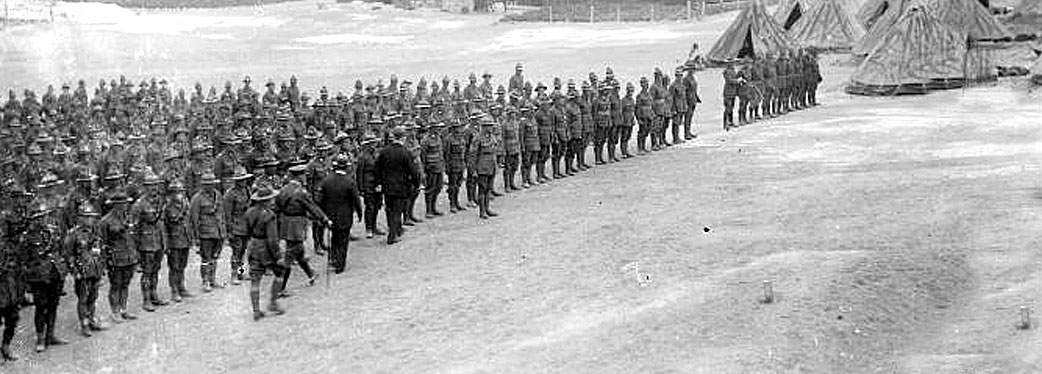SENTENCED TO DEATH
In May 1916 50 conscientious objectors from around the country were shipped to France by the army and 35 of them were sentenced to death. |
|
"It was intended to be an impressive function consisting of the NCC and Labour Battalion. I was marched out in advance of my companions and an officer read out a long statement of my crimes and then announced the sentence - 'to suffer death by being shot'."
Howard Marten
|
The Military Service Act included a hard fought for but ill-defined clause on conscientious objection. Assurances were given that COs would not be subjected to the death penalty but the position of men who had been rejected by the Tribunal and sent to the Army as insincere in their objection was unclear. Did this mean that they were subject to Army regulations, which prescribed death by shooting as punishment for disobedience on active service? No one knew, least of all the COs.
As threats and bullying had no effect on the COs the army did what armies do.
Soon after the introduction of conscription rumours about COs being sent to France to be shot began to circulate. ‘If they disobey orders of course they will be shot, and quite right too!’ said Lord Derby, Director of Recruiting, as 17 men in Landguard Fort were released from their shackles on May 7 and put on a train to France.
On being told of this, the Prime Minister immediately despatched a message to the front forbidding any execution without the knowledge of the cabinet or sending any further COs to France, but the army had ideas of its own. As the government was denying that COs had been sent to France to be shot, in a show of disregard of the elected civil authorities the Army despatched a further batch of men who were told that they were being sent to France to be shot and were marched to the train to the sound of the military band playing the ‘Death March’.
In the early days of Conscription, the Army had no idea how to deal with stubborn, principled men who refused to obey any orders. Bullying and intimidation had failed and in May, the Army stepped up its threat.
Groups of COs from around the country were quietly assembled in grim coastal Fortresses before being shipped across the channel. By moving the men to France and closer to the front line the Army believed they could intimidate them into submission. If that failed ‘under active service conditions’ they would be free to shoot the COs who continued to disobey orders.
After weeks of painful punishments and constant abuse, the COs - now known as 'The Frenchmen' - were formally told: Continue to disobey and face the death penalty. By June, the Army was running out of patience. The Frenchmen were marched out in groups to a camp outside Boulogne within sight of the cliffs of Dover and told for a final time to obey orders. When they refused, their sentence was read out.
‘I was number three on the list, and as I stepped forward I caught a glimpse of my paper as it was handed to the Adjutant. Printed at the top in large red letters, and doubly underlined, was the word ‘Death’. I can hardly analyse the feeling that flashed through my mind as I caught sight of the word,’ remembered Hubert Peet.‘The sentence of the court is to suffer death by being shot,’ said the Adjutant. ‘This sentence has been confirmed by the Commander in Chief’
There was a long pause
And commuted to ten years penal servitude.’
All were given the same long sentence, but they had escaped the death penalty. Prison meant going back to Britain and to civilian prisons. At the last moment, political pressure and frantic work at home by their supporters had saved their lives. The resolve and determination of the threatened COs became a rallying point for those in Britain and made it clear that their resistance would not be broken by Military means.
|
|
Cornelius Barritt
George Hamilton Stuart Beavis
Bernard M Bonner
Harold Francis Brewster
John Hubert Brocklesby
Clifford Cartwright
Ernest Charles Cryer
Alfred William Evans
Jack Foister
Wilfred Thomas Frear
Norman Gaudie
Clarence Hall
Stafford Hall
Geoffrey Edward Hicks
Charles Rowland Jackson
Philip Belcher Jordan
William Edwin Law
Herbert George Law
Robert Armstrong Lown
Howard Cruttenden Marten
Alfred Matthew Martlew
James Frederick Murfin
Alfred Mayers
Adam T Priestley
Leonard Renton
Oscar Gristwood Ricketts
John R Ring
John William Routledge
Henry W Scullard
Charles Herbert Senior
Ernest Shillito Spencer
Harold Edward Stanton
Alfred W Taylor
Edwin Horace Walker
Arthur Frank Walling
|


